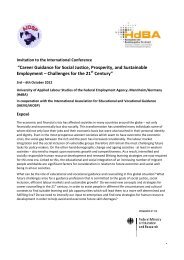Brain Drain - Hochschule der Bundesagentur für Arbeit
Brain Drain - Hochschule der Bundesagentur für Arbeit
Brain Drain - Hochschule der Bundesagentur für Arbeit
Create successful ePaper yourself
Turn your PDF publications into a flip-book with our unique Google optimized e-Paper software.
������������������������������������������������������������������������������<br />
�����������������������������������������������������������������<br />
�<br />
�<br />
Social networks play an important role in channeling workers into jobs. This has<br />
benefits: informal networks are often able to match workers and employers faster and<br />
more efficiently than formal recruitment mechanisms. But this process also has<br />
drawbacks, since widespread reliance on social networks in the market can lead to<br />
social stratification by limiting an individual’s opportunities to those that his or her<br />
peer group can provide.<br />
Among immigrants in particular, reliance on social networks is likely to indicate poor<br />
integration among individuals who face barriers to accessing formal recruitment<br />
channels, for example due to language difficulties or a poor un<strong>der</strong>standing of the<br />
local market. A trade-off emerges, therefore: social networks are likely to help<br />
immigrants to find jobs in the short run, but may limit opportunities for full social and<br />
economic integration in the longer term. (Sumption, 2009)<br />
For migrants, social networks are crucial for finding jobs and accommodation,<br />
circulating goods and services, as well as psychological support and continuous<br />
social and economic information. Social networks often guide migrants into or<br />
through specific places and occupations. Local markets can become linked through<br />
specific networks of interpersonal and organizational ties surrounding migrants<br />
(Poros 2001).<br />
For a number of years, the migration of skilled workers from developing countries<br />
was regarded as a problem of ‘brain drain’. With the recognition of networks of skilled<br />
workers’ circulation, many social scientists and national policymakers have tended to<br />
shift from a discourse of ‘brain drain’ to notions of the globalization of human capital,<br />
brain exchange, brain circulation and the creation of a global mobile workforce. The<br />
idea is to accept the fact that skilled persons may want to migrant for personal,<br />
familial and career development reasons, while seeking to encourage the skilled<br />
migrant’s return, mobilization or association with home country development. Indeed,<br />
it is transnational networks of professionals that are deemed crucial to realize such<br />
goals.<br />
There have emerged a number of schemes and types of transnational networks of<br />
expatriate professionals that can be tapped to enable their effective and productive<br />
role in a home country’s development – even without any physical temporary or<br />
permanent return. (Vetrovec, 2002)<br />
12

















